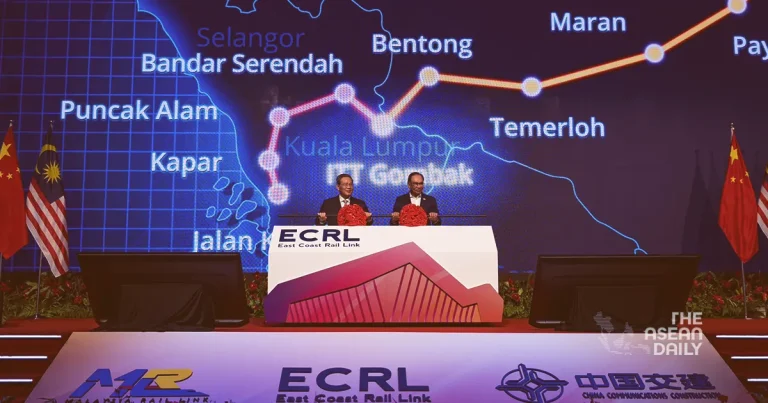19-6-2024 (KUALA LUMPUR) Chinese Premier Li Qiang expressed China’s willingness to collaborate with Malaysia in studying the possibility of connecting the East Coast Rail Link (ECRL) with the rail line in Thailand, during his visit to the Southeast Asian nation on Wednesday.
The $10.6 billion ECRL project, part of China’s Belt and Road Initiative, has been a subject of consideration by Malaysian authorities to extend the route closer to the border with Thailand. The 665km rail line, currently under construction by a Malaysian subsidiary of China Communications Construction Co Ltd, is set to link the east and west coasts of peninsular Malaysia upon its completion by the end of 2026.
Li, on the second day of his three-day visit to Malaysia, met with Prime Minister Anwar Ibrahim in the administrative capital Putrajaya. The two leaders witnessed the signing of several bilateral agreements, including one that will facilitate the export of fresh durians from Malaysia to China.
The agreement marks a significant development for Malaysia, one of the world’s largest producers of the pungent fruit, as it joins neighboring Southeast Asian countries Thailand and Vietnam in shipping fresh durian to the lucrative Chinese market. Previously, Malaysia was only permitted to export durian products and frozen whole durian to China.
In addition to the durian deal, China and Malaysia agreed on a plan for economic and trade cooperation that will span until 2028, according to a statement from Anwar’s office. The leaders also pledged to discuss further visa exemptions, bolstering the existing mutual visa-free entry policy between the two countries.
Anwar and Li also concurred that China and relevant ASEAN countries should independently handle disputes in the South China Sea issue, as reported by the Xinhua News Agency. Vietnam, the Philippines, Brunei, Malaysia, and Taiwan have competing claims over parts of the maritime area, leading to ongoing disputes with China over the validity of these claims.
Li’s visit, the first by a Chinese premier to Malaysia since 2015, coincides with Anwar’s efforts to maintain balanced ties with both China and the United States, positioning Malaysia as an attractive investment destination for both global powers.
Last month, Anwar pledged at least 25 billion ringgit ($5.3 billion) to support Malaysia’s semiconductor industry, amid the ongoing US-China contest that is reshaping global supply chains.
“We refuse to be defined by how major powers see the world. So we will continue to strive for our national and strategic interests, defined on our own terms,” Anwar said in a Facebook post on June 7. “Malaysia maintains a strong and fruitful relationship with both China and the United States.”
In recent weeks, Malaysia has announced several tech-related investment pledges from US and Chinese companies, including ByteDance, Google, and Microsoft. However, this has not been without political disagreements – with China over its expansive claims in the South China Sea, and with the US over its stance on the Israel-Hamas conflict.
China has been Malaysia’s largest trading partner since 2009, with total bilateral trade worth $98.9 billion, according to the Foreign Ministry. Li’s visit coincides with the 50th anniversary of diplomatic relations between the two countries, underscoring the importance of their economic and strategic partnership.




